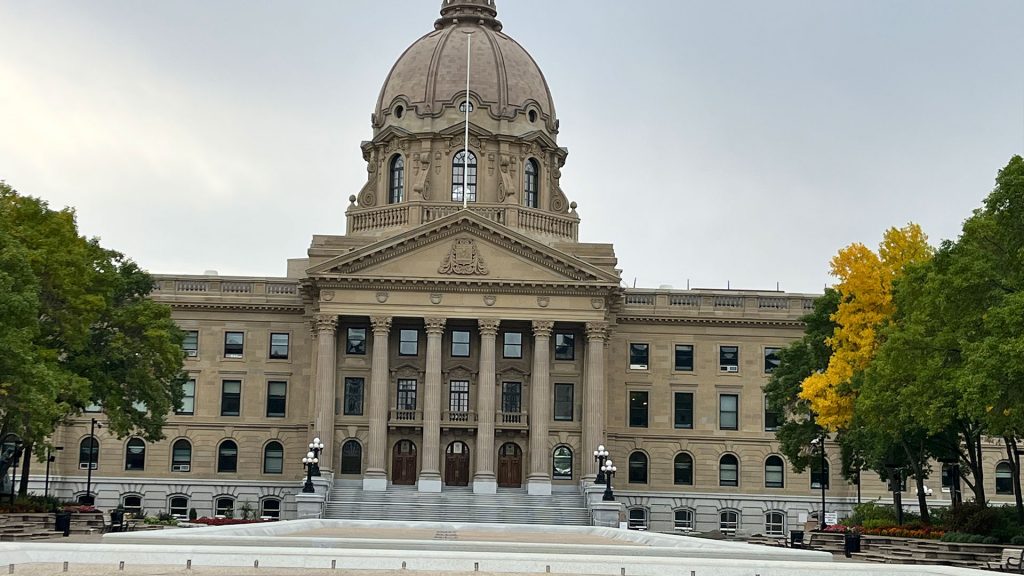
Photo: Danielle Paradis
Chiefs from both Treaty 6 and Treaty 8 are condemning the proposed Sovereignty Act legislation introduced by Danielle Smith in the Alberta legislature saying it doesn’t honour the original intent of the treaties.
Chief Tony Alexis of Alexis Nakota Sioux First Nation says that no one from the government reached out until after leaders from Treaties 6, 7 and 8 held a joint news conference earlier in November to condemn the act.
“No one spoke to us, not at all … they didn’t reach out about the Sovereignty Act. It was like we are not important enough to be spoken to … It was only after our press conference that they decided they were going to reach out,” said Alexis.
“I see that some lawyers who are already speaking are calling it unconstitutional,” Alexis said.
The proposed legislation would direct “political entities”, organizations such as Crown-controlled organizations, municipalities, school boards, post-secondary schools, municipal police forces, regional health authorities and any social agency receiving provincial money to not use provincial resources to enforce federal rules deemed harmful to Alberta’s interests.
“We believe the proposed Act is self-centred, short-sighted and in opposition to these principles. We take this opportunity to remind Albertans that we are all Treaty People, and we invite non-Indigenous people to join us in opposition to this divisive proposed legislation,” said a joint statement by the Chiefs for Treaty Six.
The bill states that it cannot infringe on First Nations rights, a concern Alberta treaty chiefs have raised. But Alexis says that does not go far enough.
“The area that talks about Indigenous people … it should be crossed out an in its place it should say will not violate treaty and inherent rights.
“We are at the point now where it has become political football,” said Alexis.
The bill will grant Smith and her cabinet broad powers to rewrite provincial laws behind closed doors in an effort to push back against Ottawa.
“As Indigenous Peoples, we understand individual freedom as something that can only exist in the context of good relations with others, including our ancestors and the generations to come,” said Treaty 6 chiefs.
“We also must take this opportunity to remind the premier of the Relationship Agreement between the Confederacy of Treaty Six First Nations and the Government of Alberta signed in July of 2022, which ‘formalizes a government-to-government relationship based on collaboration, commitment and cooperation.’”
The release also said that a lack of prior consultation with Indigenous Peoples about this proposed act indicates that reconciliation is not a priority for this premier or this government.
The chiefs of Treaty 8 also released a statement with strong words to Danielle Smith.
“Premier Danielle Smith, as parliamentary Crown representative, you and your government are in dishonor of Treaty No. 8! Treaties are essential to all Peoples, including Albertans.
“Again, Treaties are the exclusive reason of which Canada, and all the Provinces and Territories exist today,” said the statement.
Treaty 7 is in the middle of five elections and a call to their branch office confirms that they are not currently planning to release a statement at this time.
The Métis Nation of Alberta, also in the middle of a vote on their new constitution could not immediately be reached for comment.
“The Canadian Constitution is clear that the federal and provincial governments are equals, each with our own areas of exclusive jurisdiction,” Smith said in a statement Tuesday after her government introduced the Alberta Sovereignty Within A United Canada Act.
When reached out to for comment the Premier’s office said, “In the interests of strengthening relationships between Alberta’s government and Indigenous Peoples, the Premier will, alongside Minister of Indigenous Relations, Rick Wilson, reach out to the Chiefs of Treaty 6, 7 and 8 to book in person meetings for the purposes of direct discussions on this issue including building upon shared values of economic prosperity and autonomy from the federal government.”
Act promises to follow the constitution
In the bill, the United Conservative Party (UCP) government promises to follow court rulings and the Constitution, but said it would be up to the federal government to sue the province to resolve disputes instead of the other way around.
Smith said if the bill passes, her government would use it as early as this spring to fight the federal government on a slew of issues, including energy development, agriculture, health care, education, firearms, child care, property rights and social programs.
It was the cornerstone of her successful campaign to win the leadership of the UCP last month to take over from Jason Kenney as premier.
The bill was tabled after Lt.-Gov. Salma Lakhani read aloud in the chamber the speech from the throne, launching a new legislative session.
In the speech outlining government plans and priorities, Lakhani said the four-week fall sitting would focus on helping Albertans with inflation, health care and battling the federal government.
Ottawa is not our ruler
“Ottawa is not our ruler. Ottawa is our partner and it needs to begin acting like it,” Lakhani told the assembled legislature members and dignitaries.
In her role as Lt.-Gov, Lakhani reads the speech on behalf of the government. In the past, Lakhani has mentioned reservations about the Sovereignty Act and has said she will need to consult further.
Treaty 8 chiefs said that they agree with University of Alberta Law Professor Eric Adams who states, “the most important job of Alberta’s Lieutenant-Governor Salma Lakhani, is to protect the institution of the Crown.”
The sovereignty bill sets out the framework to launch fights with the feds.
Under the bill, cabinet ministers or Smith would decide whether federal rules are harmful to Alberta. The bill does not give a legal definition of what constitutes harm.
Cabinet would then craft a resolution laying out the nature of the harm and steps that need to be taken to fight back. The 87-member legislature would vote on the resolution and if it gets a majority, the resolution passes and cabinet goes to work implementing it.
Cabinet can implement the resolution by using existing powers in legislation or it can unilaterally amend any provincial laws it deems applicable. Those laws are normally debated and passed in the legislature.
The bill says while cabinet can then direct any “provincial entity” to not enforce those federal laws or policies, it cannot do so with individuals or private businesses.
Any resolution passed by the assembly would expire after two years, unless the legislature votes to end it earlier. However, cabinet can extend orders and rules made under any resolution for a maximum of two extra years.
The window to fight the act in court in a judicial review is reduced from the normal six-month time frame to 30 days.
The Saskatchewan government introduced legislation with a similar aim last month, focusing on reinforcing provincial rights over natural resources.
The Métis Nation of Saskatchewan as well as the Federation of Sovereign Indigenous Nations rejected the Saskatchewan First Act.
The FSIN executive said that First Nations “have always maintained that they never relinquished their rights to the natural resources on their lands and the province has never fully considered the environmental affects on First Nations.
Earlier Tuesday, Smith was sworn in as the new member for Brooks-Medicine Hat after winning a byelection for the seat earlier this month.
It was her first time back on the floor the legislature chamber since the spring of 2015.
At that time, Smith was with the Progressive Conservatives, having led a mass floor crossing of her Wildrose Party months earlier. She failed to win a nomination for the PCs in 2015 and returned to journalism as a radio talk-show host for six years.
Story with files from Canadian Press
This story was updated with comment from the Premier’s office 11/30/2022 4:10 PM MT










